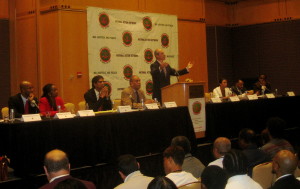Sharpton’s Group Holds National Conference in Atlanta
(APN) ATLANTA — Several hundred local and national activists attended a national conference held in Atlanta at the Hyatt Regency Hotel by the National Action Network, a group organized by Rev. Al Sharpton, this past weekend. Sharpton, a 2004 candidate for the Democratic nomination for President, is a syndicated talk show host and civil rights activist.
As part of the first day of the conference, local and nationally recognized defense and prosecuting attorneys discussed the current state of the nation’s criminal justice system during a town hall meeting Thursday, August 13, 2009.
Several hundred attendees listened to panelists share perspectives on the system, highlighting concerns and offering potential solutions.
DeKalb County Solicitor General Robert James and District Attorney Gwendolyn Keyes Fleming discussed initiatives they have taken to help young people avoid trouble.
“There is a direct pipeline from our schools into our jails,” James said, pointing out that 88 percent of Georgia’s inmates are high school dropouts.
A program in DeKalb called Jobs Not Jail allows youth ages 17 to 24 who have been in trouble with the law a chance to receive complete counseling, education, job training, and, eventually, the opportunity to see their criminal case expunged.
“You have to change his [sic] perception but you also have to change his condition,” James said, noting it is also important to enforce compulsory education laws on “not only children but also parents.”
Through a program called Project Perfect Attendance, James said DeKalb has seen 750 elementary, 1,000 middle, and 1,000 more high school students attend school on a regular basis over the last year.
“When parents are parents, things change,” he said.
Fleming concurred with James the system has to address truancy and also offer constructive opportunities for vulnerable teens.
To help young girls avoid fighting and other trouble, Fleming launched the Just Us G.A.L.S. (Girls Achieving Leadership & Success) program.
Middle and high school girls who win an essay contest are selected to attend a conference with the district attorney and participate in workshops that include leadership; goal setting; building healthy relationships; and combating peer pressure, such as drugs, gangs, and violence.
DeKalb also offers a pretrial intervention program for first time non-violent offenders, who go through a monthly program, learn productive skills and why what they did is wrong, Fleming said. If they complete the program, they have their case dismissed and their record expunged.
“We think an educated community is a safer community,” Fleming said. “You have to be smarter on crime.”
Kevin Gray, former President of the American Civil Liberties Union of South Carolina, said enforcing drug laws is counterproductive and more emphasis should be placed on treatment.
“It’s the drug war that gives the police the power to lock up our children,” he said, arguing prosecutors and what he called the “militarized police force” should have less power.
“If you have to depend on people with guns to enforce the laws, then the law is useless,” Gray said.
Gerald Griggs, a former public defender, said Georgia is not adequately funding its public defender system.
“How can people defend somebody if they’re worried about their paychecks?” he asked.
Inadequate legal defense was one contributing factor in the case of Georgia death row inmate Troy Anthony Davis, who–as covered in depth by Atlanta Progressive News–has been on death row since 1991 for the murder of a Savannah police officer.
Since his trial, seven of nine witnesses have either changed or recanted their original testimony in sworn affidavits, raising serious concerns about his guilt.
Just days after the NAN conference concluded, the Supreme Court of the US finally agreed Davis should get a new hearing.
Bruce Harvey, an Atlanta defense attorney, is concerned “actual innocence doesn’t make a difference” in too many cases.
“The U.S. Supreme Court says the death penalty is racially skewed but that’s the way it is,” Harvey noted. “How can you not be outraged by that?”
Harvey called on citizens to press lawmakers to eliminate mandatory minimums and to prohibit law enforcement from using racial profiling.
Marilee Fiebig, who works on immigration issues for the Atlanta law firm Alston & Bird, said the 287(g) immigration programs are giving local law enforcement too much power and exposing more Hispanic and Latino citizens to racial profiling. APN has also covered the 287(g) issue in depth as well.
Other first day conference events included a panel discussion on whether or not same-sex relationships are a civil rights issue and a discussion on the future of historically black colleges and universities.
The conference lasted from Thursday through Saturday.
About the author:
Jonathan Springston is a Senior Staff Writer for Atlanta Progressive News and is reachable at jonathan@atlantaprogressivenews.com.
Revised syndication policy:
Our syndication policy was updated June 2007. For more information on how to syndicate Atlanta Progressive News content, please visit: http://www.atlantaprogressivenews.com/extras/syndicate.html

